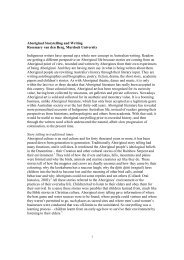Edward Koiki Mabo: The Journey to Native Title - [API] Network
Edward Koiki Mabo: The Journey to Native Title - [API] Network
Edward Koiki Mabo: The Journey to Native Title - [API] Network
Create successful ePaper yourself
Turn your PDF publications into a flip-book with our unique Google optimized e-Paper software.
Eddie <strong>Mabo</strong><br />
Throughout the twentieth century, the oppressive Queensland administration had<br />
segregated the Meriam and other Torres Strait islanders from mainland developments<br />
under the policy of protection. It had fostered the change from a comfortable, satisfying<br />
subsistence economy based on agriculture and fishing <strong>to</strong> a cash economy based on<br />
the pearlshell, bêche-de-mer and trochus fisheries. <strong>The</strong> coming of christian missions<br />
in 1871 had, in effect, reinforced the cultural changes occurring in the Torres Strait.<br />
However, the islanders made christianity their own religion. <strong>The</strong>y also incorporated<br />
their involvement in the fisheries and their participation in the colonial administration<br />
of their islands in<strong>to</strong> their culture. Increasingly, Torres Strait Islanders collaborated<br />
in the administration of Queensland government policy. In doing so they were able<br />
<strong>to</strong> minimise the white colonialist presence on their islands and maintain their life<br />
style in a way unknown on Queensland’s Aboriginal reserves. <strong>The</strong>y also funded<br />
their own colonialist controls by working in the fisheries.<br />
At the time <strong>Mabo</strong> was growing up on Mer, the islanders provided cheap black<br />
labour for the hundred or so ‘Master Boats’ owned by white businessmen. Throughout<br />
the Torres Strait some islander families owned their own smaller luggers, called<br />
‘company boats’. An early missionary, FW. Walker, had encouraged islanders <strong>to</strong><br />
buy their own boats and the Queensland government had supported this development<br />
when, in 1904, they began applying protectionist legislation <strong>to</strong> the islanders as they<br />
had <strong>to</strong> the Aborigines. However, the islanders were forced <strong>to</strong> sell their catch only <strong>to</strong><br />
the Queensland administration at a much lower price than was generally available<br />
from the commercial buyers. <strong>The</strong> master boats and the company boats <strong>to</strong>ok most of<br />
the younger men away from the islands for much of the year, leaving the women, the<br />
children, the old men and those who didn’t wish <strong>to</strong> recruit <strong>to</strong> attend <strong>to</strong> church and<br />
council matters, <strong>to</strong> tend the gardens, <strong>to</strong> fish, <strong>to</strong> catch crabs, crayfish and birds and <strong>to</strong><br />
collect oysters and other molluscs.<br />
<strong>The</strong> colonialist controls had been implemented by the protec<strong>to</strong>r stationed at<br />
Thursday Island, the administrative centre, and by a teacher-administra<strong>to</strong>r on each<br />
of the inhabited islands. As the controls tightened and the islanders came <strong>to</strong> understand<br />
their situation, they resented their loss of freedom, especially the government’s control<br />
over their wages and bankbooks, but also such degrading measures as a nightly<br />
curfew.<br />
In 1936, the islanders on company boats stunned their white overlords by going<br />
on strike simultaneously throughout the strait. <strong>The</strong> Queensland administration had<br />
created a unity of purpose among people who had previously been concerned with<br />
their own island interests. <strong>The</strong>y had also been drawn <strong>to</strong>gether in<strong>to</strong> world-wide<br />
capitalism through the fisheries, introduced <strong>to</strong> a world-wide religion and its Torres<br />
Strait wide organisation through the missionaries, and become enmeshed in a western<br />
colonialist administration. <strong>The</strong> 1936 maritime strike was consequently successful<br />
because of the wider Torres Strait Islander identity produced by colonialist expansion,<br />
as well as being caused by the domination resulting from it.<br />
By 1936, the year <strong>Koiki</strong> <strong>Mabo</strong> was born, Torres Strait creole had developed<br />
throughout the Strait as a lingua franca, and on some islands had replaced the<br />
traditional language, but not on Murray. <strong>The</strong> islanders were also becoming familiar<br />
with English, the third language of Murray islanders. Torres Strait Islander English<br />
109


![Edward Koiki Mabo: The Journey to Native Title - [API] Network](https://img.yumpu.com/33197148/2/500x640/edward-koiki-mabo-the-journey-to-native-title-api-network.jpg)
![Dream and Nightmare in William Gibson's ... - [API] Network](https://img.yumpu.com/49298598/1/184x260/dream-and-nightmare-in-william-gibsons-api-network.jpg?quality=85)

!['Fuck All Editors': The Ern Malley Affair and Gwen ... - [API] Network](https://img.yumpu.com/42446228/1/184x260/fuck-all-editors-the-ern-malley-affair-and-gwen-api-network.jpg?quality=85)
![Polona Petek - [API] Network](https://img.yumpu.com/40542952/1/190x245/polona-petek-api-network.jpg?quality=85)
![to download as a PDF. - [API] Network](https://img.yumpu.com/35170825/1/184x260/to-download-as-a-pdf-api-network.jpg?quality=85)
![Gallipoli, Kokoda and the Making of National Identity - [API] Network](https://img.yumpu.com/31766380/1/184x260/gallipoli-kokoda-and-the-making-of-national-identity-api-network.jpg?quality=85)
![Indigenous Knowledge and Pharmaceuticals - [API] Network](https://img.yumpu.com/24108846/1/184x260/indigenous-knowledge-and-pharmaceuticals-api-network.jpg?quality=85)
![Ferals: Terra-ism and Radical Ecologism in Australia - [API] Network](https://img.yumpu.com/13809010/1/184x260/ferals-terra-ism-and-radical-ecologism-in-australia-api-network.jpg?quality=85)
![Big Chief Little Wolf: Wrestling, Radio and Folklore in ... - [API] Network](https://img.yumpu.com/12204748/1/184x260/big-chief-little-wolf-wrestling-radio-and-folklore-in-api-network.jpg?quality=85)
![Dark Tourism and the Celebrity Prisoner - [API] Network](https://img.yumpu.com/4348795/1/184x260/dark-tourism-and-the-celebrity-prisoner-api-network.jpg?quality=85)